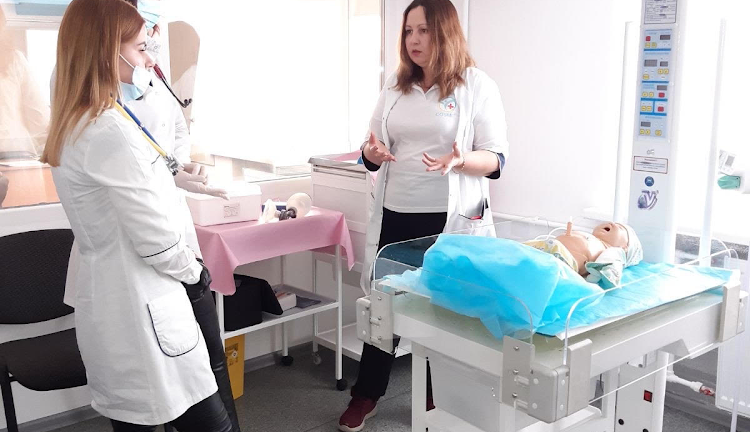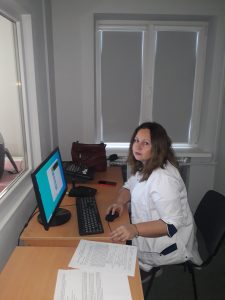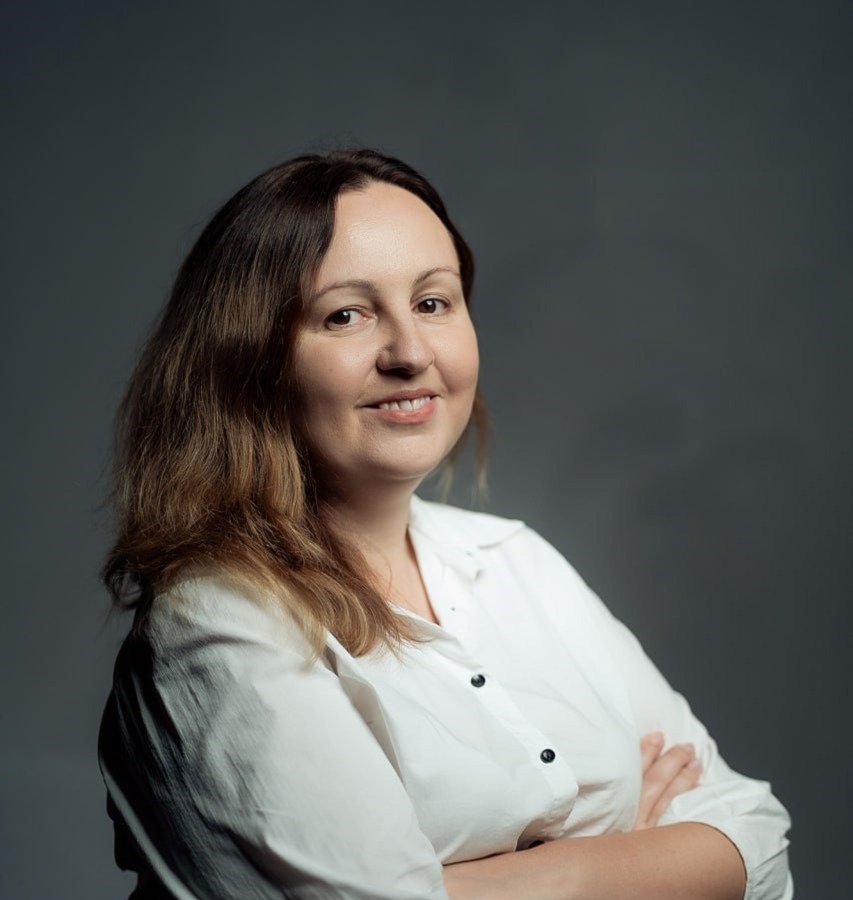EIT HEI Initiative in Ukraine: Building strong innovation networks in the face of adversity
Ukraine
Interview with Dr Olena Korotun, HIVE project
As the Russian invasion continues to cast a dark shadow over Ukraine, the country’s education sector is facing an uphill battle. In this time of dire need, the European Institute of Innovation and Technology (EIT) and its Knowledge and Innovation Communities have stepped up, providing invaluable aid to Ukrainian universities, students and staff. Acknowledging the multifaceted nature of the crisis, the EIT is pooling together available resources through the EIT HEI Initiative and its projects to offer comprehensive assistance.
We talked to Dr Olena Korotun from the Centre of Simulation Medicine and Innovation Technologies – a Ukrainian partner of the HIVE project. Learn more about Olena’s involvement in the EIT HEI Initiative and how HIVE has impacted higher education in Ukraine.
This article is part of a series about the EIT HEI Initiative’s support for Ukrainian higher education institutions.
Could you introduce yourself and the project you’re working on?
I’m an associate professor at the Department of Paediatrics and Paediatric Infectious Diseases, instructor at the Centre of Simulation Medicine and Innovation Technologies, member of the Grant Policy Department, and coordinator of the HIVE project at Bukovinian State Medical University in Chernivtsi, Ukraine.
HIVE (HEI Innovation for Knowledge Intensive Entrepreneurship) aims to strengthen the innovation and entrepreneurial capacity of its partner higher education institutions by networking, exchanging best practices and improving the commercialisation innovation ecosystems.
The project consortium includes the University of Latvia (our lead partner), the University of Coimbra, Riga Stradins University, the Bulgarian Chamber of Commerce and Industry, the Czech University of Life Sciences Prague, the University of Applied Sciences Wiener Neustadt, TED University, ESSEC Business School, Bukovinian State Medical University, Ivan Franko National University of Lviv and Dnipro University of Technology. Coursera is an associated partner of the HIVE project.
What made you decide to join the EIT HEI Initiative community?
Our university’s administration and the community believe that constant development is a necessary condition for the provision of high-quality education. We are a medical university, and we don’t have a faculty of business or economics. So when the University of Latvia offered us to join the HIVE consortium with the support of EIT Health, we realised the existing gap and limitations our students were facing. This cooperation has now become an essential part of the strategy for our development.
We would like to highlight that the support of the EIT HEI Initiative and HIVE project has been incredibly valuable and important for our university during these hard times.
Why is it important to boost innovation, entrepreneurship and deep tech in higher education in Ukraine?
Before the war, Ukraine was in a stage of active development. Now, besides being a huge and horrific humanitarian catastrophe, the war has also caused a big economic and political crisis, uncovering many weaknesses and pain points of the system.

As horrible as these destructions are, after the victory we will have the chance to rebuild our country in a better way, finally free from post-soviet heritage. That is why, it is extremely important for us to start acting and developing as soon as possible.
Innovation, entrepreneurship and deep tech are essential fields in higher education nowadays. In Ukraine, however, we still have many gaps both on the institutional and national level. This makes EIT HEI Initiative projects especially important for us.
How has HIVE boosted innovation, entrepreneurship and deep tech in Ukrainian higher education institutions so far?
Firstly, the HIVE consortium gave us a strong network to rely on. We also organised a network of Ukrainian higher education institutions involved in the EIT HEI Initiative projects. The goal is to share our challenges and to disseminate and enhance our results on the national level.
One very useful tool, which we developed within the project, has been the Handbook of Good Practice of Networking. Thanks to this handbook, we are now discussing cooperation agreements with several European innovation networks.
And, of course, we are especially glad that two Ukrainian universities (Ivan Franko National University of Lviv and Dnipro University of Technology) have joined the HIVE project for the second phase. We believe that our united efforts will boost innovation development in Ukraine.
Secondly, we have also had some institutional changes. Thanks to HIVE, we have provided a deep analysis of the existing strengths and weaknesses at the institutional and national levels. Based on these data, we have implemented significant changes in the management and organisation of innovations development at the university.
And lastly, more than 50 students and several academics were trained in innovation and entrepreneurship.
How has the Russian invasion impacted your project activities?

Although our university is one of ‘the lucky ones’ since it is located in the safer western part of Ukraine, the Russian invasion has impacted us in many ways. For example, some of our team members (medical doctors) joined the military, while others decided to move abroad to protect their children and family.
Almost every staff member is involved in one or several volunteer projects. They help with the evacuation and settling of internal refugees from the eastern regions, give first aid training, network with funds and donors, collect money for medical supplies, answer hotlines and so on. This takes up a lot of our time and is emotionally taxing, but we consider it our contribution to the victory of Ukraine.
Our university used to have a lot of international students − around 60%. Now the number of new students has dramatically decreased.
Between November 2022 and March 2023, it was very hard for us to join project meetings because of the blackouts. In addition, our work and our students’ learning are periodically interrupted by air-raid sirens.
And lastly, due to martial law all expenses of the university have been cut by the state (except for utility bills, salaries and targeted funds). This has limited our project activities since project funding is received at a later stage. However, we are very proud of our team who are enthusiastic and willing to work for the development of our university and country.
What’s next for the HIVE project?
We are in the middle of the project now and really looking forward to the next steps! Next semester, our students and staff will be able to take the course ‘Entrepreneurship: turning ideas into business’. And we are very proud of our colleagues Dr Tetiana Antofiichuk and Dr Tetiana Shchudrova who were responsible for the module ‘Innovations and entrepreneurship in healthcare’.
We are also expecting the implementation of the Innovation Vision Action Plan at our university.
Of course, we still have a long way to go and some tasks are still very challenging for us. For instance, we are now actively working on mechanisms for developing and supporting start-ups at our university. But we believe that, with the support of the HIVE consortium and EIT Health, we will overcome all obstacles in our way.
Learn more about the HIVE project.
Share your experience with the EIT HEI Initiative and inspire higher education institutions across Europe to boost their innovation and entrepreneurship capacity.
Publication: 15 August 2023
